Zoom
Trash

Creative Communication. How to Recite a Poem Like an Expert. If you would like to recite a poem for an audience – whether you are reciting a poem that you wrote yourself, or a poem by someone else – there are many different ways to go about it.
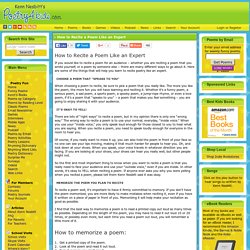
Here are some of the things that will help you learn to recite poetry like an expert. Choose a Poem that “Speaks to You” Acrostic Poems. Grades 3 – 5 | Lesson Plan | Standard Lesson Vocabulary Solutions: A Mixture of Science, Conversation, and Writing In this lesson, students conduct a science experiment and later discuss the events of the lab during shared writing.
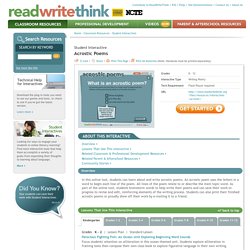
Students explain the procedure in their own words and then revise to include content specific vocabulary. Finally, students reflect on new words added to their writing using the Trading Card Creator interactive. Grades 7 – 10 | Lesson Plan | Standard Lesson Engineering the Perfect Poem by Using the Vocabulary of STEM. Diamante Poems. In this online tool, students can learn about and write diamante poems, which are diamond-shaped poems that use nouns, adjectives, and gerunds to describe either one central topic or two opposing topics (for example, night/day or winter/spring).
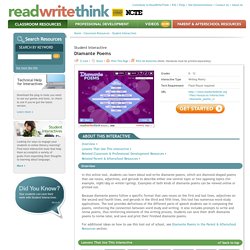
Examples of both kinds of diamante poems can be viewed online or printed out. Because diamante poems follow a specific format that uses nouns on the first and last lines, adjectives on the second and fourth lines, and gerunds in the third and fifth lines, this tool has numerous word-study applications. The tool provides definitions of the different parts of speech students use in composing the poems, reinforcing the connection between word study and writing. It also includes prompts to write and revise poems, thus reinforcing elements of the writing process. Found Poems/Parallel Poems. ReadWriteThink couldn't publish all of this great content without literacy experts to write and review for us.
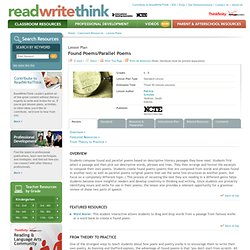
If you've got lessons plans, activities, or other ideas you'd like to contribute, we'd love to hear from you. More Find the latest in professional publications, learn new techniques and strategies, and find out how you can connect with other literacy professionals. More Teacher Resources by Grade Your students can save their work with Student Interactives. More Home › Classroom Resources › Lesson Plans Lesson Plan Overview Featured Resources. Haiku Poem Interactive. Download the plug-in tools you need to use our games and tools, or check to see if you've got the latest version.
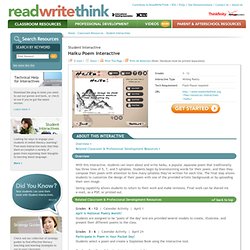
Learn more Looking for ways to engage your students in online literacy learning? Find more interactive tools that help them accomplish a variety of goals-from organizing their thoughts to learning about language. More Your students can save their work with Student Interactives. More Check out our collection of strategy guides to find effective literacy teaching and learning strategies to use in your classroom.
Riddle Interactive. Download the plug-in tools you need to use our games and tools, or check to see if you've got the latest version.
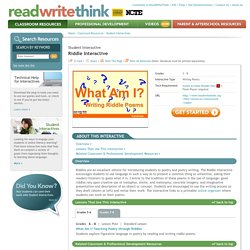
Learn more Looking for ways to engage your students in online literacy learning? Find more interactive tools that help them accomplish a variety of goals-from organizing their thoughts to learning about language. Theme/Shape Poems. In this online tool, elementary students can write poems based on shapes from five different categories: Nature, School, Sports, Celebrations, and Shapes.
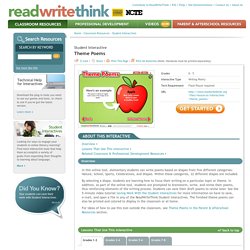
Within these categories, 32 different shapes are included. By selecting a shape, students are learning how to focus their writing on a particular topic or theme. In addition, as part of the online tool, students are prompted to brainstorm, write, and revise their poems, thus reinforcing elements of the writing process. Students can save their draft poems to revise later.
See the 5-minute video tutorial Saving Work With the Student Interactives for more information on have to save, e-mail, and open a file in any of the ReadWriteThink Student Interactives. For ideas of how to use this tool outside the classroom, see Theme Poems in the Parent & Afterschool Resources section. Word Mover. Grades K – 2 | Lesson Plan | Standard Lesson A Bear of a Poem: Composing and Performing Found Poetry Children find favorite words, phrases, and sentences from familiar stories.
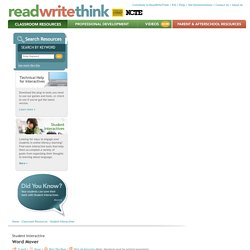
Working together, they combine their words and phrases to create a poem. The poem is then shared as performance poetry. Grades 9 – 12 | Lesson Plan | Standard Lesson I Have a Dream: Exploring Nonviolence in Young Adult Texts Students will identify how Martin Luther King Jr.' Exploring the Power of Martin Luther King, Jr.' Students explore the ways that powerful and passionate words communicate the concepts of freedom, justice, discrimination, and the American Dream in Martin Luther King, Jr.' Discovering Traditional Sonnet Forms.
Line Break Explorer. Download the plug-in tools you need to use our games and tools, or check to see if you've got the latest version.
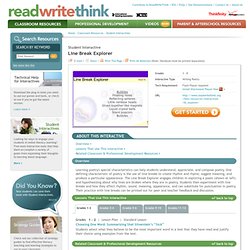
Learn more Looking for ways to engage your students in online literacy learning? Find more interactive tools that help them accomplish a variety of goals-from organizing their thoughts to learning about language. More Your students can save their work with Student Interactives. Letter Poem Creator. Poetic Power. Writing with Writers: Poetry Writing. FizzyFunnyFuzzy: Fun Poetry For Kids. Different Types of Poems for Kids. Kenn Nesbitt's Poetry for Kids.